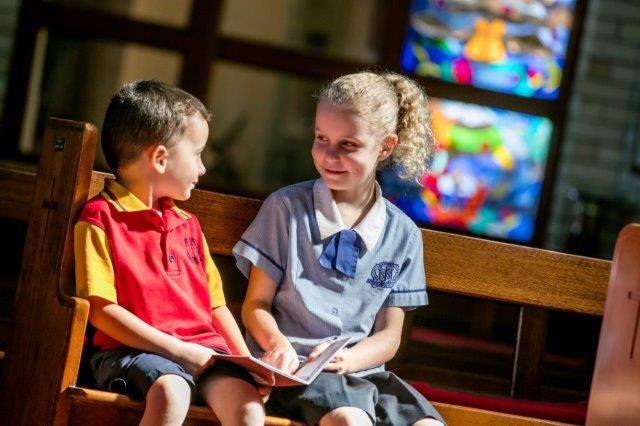St Joseph's endeavours to provide a wide range of learning opportunities across all areas of the curriculum and to nurture a genuine passion for learning by providing an environment in which students feel safe to develop their talents and interests. Student well-being is strongly linked to learning. All students are shown the value of developing positive dispositions and mindsets for learning. Teachers and students use a common language of learning to enable opportunities for students to talk about their learning and to talk about themselves as learners.
St Joseph's curriculum is responsive to the needs and aspirations of all students and is organised in ways that reflect opportunity, inclusivity and flexibility for all students. St Joseph's curriculum offerings and times allocated to each learning area are guided by Brisbane Catholic Education and ACARA across all Year P-6 classes. We engage with the following key learning areas:
As appropriate, concepts are developed, taught and assessed in a connected way maintaining the rigor of each specific learning area.
Further learning areas including Music, Physical Education and Indonesian are addressed for classes P-6 by specialist teachers every week. A specific Instrumental Immersion program is designed and delivered as part of the Year 4 curriculum offering.
St Joseph's organisation of the curriculum reflects ACARA's emphasis on the priority development of literacy and numeracy foundations through English and Mathematics and across the curriculum.
St Joseph's ensures planning for all students is informed by student data and student achievement and development is monitored to ensure high expectations for all students.
Religious Education
The Brisbane Catholic Education vision for Religious Education is for students who are challenged to live the gospel of Jesus Christ and who are literate in the Catholic and broader Christian tradition so that they might participate critically and authentically in faith contexts and wider society.
The launch and implementation of the new Brisbane Catholic Education Religious Education Curriculum occurred in 2013. All schools in the Brisbane archdiocese began implementation in 2013 with the view to full implementation by the end of 2014.
Religious Education has two dimensions- “Teaching people religion and teaching people to be religious in a particular way” (Gabriel Moran- 1991). These two dimensions are distinct yet complementary. Through engagement with both dimensions of Religious Education, we are challenged to be cultural agents in light of the gospel and authentic witnesses to the mission of Jesus Christ in the world today.
The Religion Curriculum P-12 has four strands each with its own distinct body of knowledge: Sacred Texts, Beliefs, Church and Christian Life. These strands are interrelated and should be taught in an integrated way; and in ways that are appropriate to specific local contexts. Each strand has 3 distinct yet interrelated sub-strands.
The Sacred Texts strand explores the ongoing story of God’s loving relationship with all of creation. Students are challenged to see that they are a part of this story by deepening their awareness of these sacred texts and exploring how these texts provide guidance, inspiration and strength for their own lives.
The Beliefs strand explores foundational Catholic Christian beliefs and teachings and how these have found expression over time, while also exploring the beliefs and practices of other major world religions. Students are challenged to critically reflect on these beliefs and teachings as they come to understand and value their own beliefs and the beliefs of others.
The Church strand explores the church as both a human community and spiritual community, past and present, and how the church is called and challenged to express the continuing presence of Jesus Christ in the world. Students are challenged to know and understand the history of the church and better appreciate the church of the present so that they might contribute critically and effectively to the church of the future.
Christian Life explores the foundations for Christian moral living, how this is expressed through action for justice and ways in which prayer and spirituality support the lives of believers. Students are challenged to make life-enhancing choices for themselves and all of creation and to respectfully participate in a variety of prayer experiences.
The Religion Curriculum P-12 is designed in line with the Australian Curriculum. Year-level descriptions, content descriptions, achievement standards, content elaborations, general capabilities and cross-curricular priorities are included.
Religious Life of the School
The Religious Life of the School P-12 is focused on the second dimension of Religious Education, commonly referred to as “teaching people to be religious in a particular way” (Moran, 1991). The Religious Life of the School P-12 provides a lens through which a school may audit and further develop its religious life.
The Religious Life of the School P-12 comprises four interrelated components:
- Religious Identity & Culture
- Evangelisation & Faith Formation
- Prayer & Worship
- Social Action & Justice
Religious Identity & Culture
"From the first moment that a student sets foot in a Catholic school, he or she ought to have the impression of entering a new environment, one illumined by the light of faith, and having its unique characteristics. The inspiration of Jesus must be translated from the ideal into the real. The Gospel spirit should be evident in a Christian way of thought and life which permeates all facets of the educational climate." for, C. (1988). The Religious Dimension of Education in a Catholic School. Hyperion Books.
Jesus Christ is central to understanding Christianity. Catholic schools introduce students to a view of the world founded on scripture and the ongoing tradition of the Church and embedded in the religious identity and culture of the school. This worldview is expressed through its beliefs, values and practices, quality relationships, the aesthetic, social and physical environment and its organisational structures and procedures.
These expressions are shaped and developed in such a way as to maximise their positive impact upon the religious and spiritual formation of all members of the St Joseph’s School community. Knowledge and skills of staff and students in dance, drama, digital technologies, music and visual arts are utilised to effectively communicate and promote elements of the religious identity and culture of the school. Our school derives its identity and culture from its Catholic Christian character and is called to be a real and living expression of the Church’s pastoral mission in the world.
Evangelisation and Faith Formation
"Evangelisation means bringing the Good News to all strata of humanity, and through its influence, transforming humanity from within and making it new.
To evangelise is, first of all, to bear witness, in a simple and direct way, to God revealed by Jesus Christ, in the Holy Spirit; to bear witness that in his Son God has loved the world - that in his Incarnate Word, he has given being to all things and has called every man and woman to eternal life." VI, P. (1976). On Evangelization in the Modern World.
Catholic schools invite people to move towards commitment to, and involvement in, a Christian community. This occurs through the process of evangelisation. People are invited to share in a more conscious and deepened way the Christian community’s experience of the life, death and resurrection of Jesus.
Within the context of the Catholic school, faith formation describes how its members are immersed in the shared beliefs, language, symbols, liturgy and activities of the Catholic Christian tradition. While schools recognise that they contribute to the faith formation of individuals, faith formation is a lifelong process. The role of the Catholic school in faith formation is to nurture both those who are already actively engaged with a faith tradition and those who are yet to engage in a journey of explicit, active faith.
Evangelisation and faith formation are focused in an explicit way on the call to hear the gospel of Jesus Christ, to respond to it in daily life and to deepen personal understanding and faith.
Prayer & Worship
"Prayer cannot be reduced to the spontaneous outpouring of interior impulse: in order to pray, one must have the will to pray. Nor is it enough to know what the Scriptures reveal about prayer: one must also learn how to pray. Through a living transmission within the believing and praying Church, the Holy Spirit teaches the children of God how to pray." Catholic Church. (1994). Catechism of the Catholic Church. Liguori Publications
Prayer is the raising of one’s mind and heart to God or the requesting of good things from God. To pray is to respond to the wonder and mystery of life. In the Christian tradition, prayer fosters a personal and living relationship with God as Trinity.
"Worship is described as the adoration of God that may be expressed through praise, thanksgiving, self-offering, sorrow and petition. Worship of God is described as private when it occurs anywhere and at any time. Liturgy is public worship centred on Christ. Worship can be expressed through bodily gestures or postures, in rites and ceremonies." Redemptorist Pastoral Publications. (2004). The Essential Catholic Handbook. Redemptorist Pastoral Publication.
Prayer and worship are integral to the life of all Catholic schools and have the potential to nourish the spiritual growth of all members of the school community. Prayer and worship provide the context and the resources for individuals and groups to celebrate their life and identity as members of the school and to nurture their relationship in faith with God and with one another. Prayer and worship create a sense of purpose and identity within the school community by drawing its members into an understanding of their shared humanity, linking them with the Church throughout the world and sending them out to share the good news.
Social Action & Justice
"What does the Lord require of you? To act justly and to love tenderly and to walk humbly with your God." (Micah 6:8)
Three major themes run through scripture and Catholic social teaching. A core theme is that each human person is made in the image and likeness of God and has an inalienable human dignity and worth. Derived from this core theme are two further themes. These are the rights and duties that are proper to human persons and the freedom and responsibility that underpin these rights and duties. In more recent times there is growing awareness of the application of these three themes to both human persons and the whole of God’s creation.
Ten themes of Social Justice give expression to the human worth and dignity of each individual made in the image and likeness of God. These are:
Respect for the human person
Preferential option for the poor
Political and economic rights
Promotion of the common good
Subsidiarity
Political participation
Economic justice
Stewardship
Global solidarity
Promotion of peace
Social action brings into sharp focus Jesus’ vision for the coming of the Kingdom of God where sinfulness, brokenness and injustice are transformed and peace and harmony are restored. For Catholics, social action finds its foundation in the scriptures, particularly the Gospels and in the Church’s Social Teaching.
Applying social action and justice requires two important dispositions: empathy (the capacity to stand in the shoes of another) and solidarity (the capacity to walk with another). Catholic schools work to build these dispositions in students through programs for service learning, social justice programs and outreach experiences. Social action and justice in schools have a particular connection with knowledge and skills from the social sciences. Foundational to the social sciences are: notions of continuity and change; democratic process; participation; stewardship; sustainability; peace; justice; cultural diversity; inclusion; power; resources and social systems. Schools plan, implement and reflect upon experiences of social action and justice, drawing on the social sciences, scripture and Catholic social teaching.

|  |
© BCE, St Joseph's Primary School (2020)